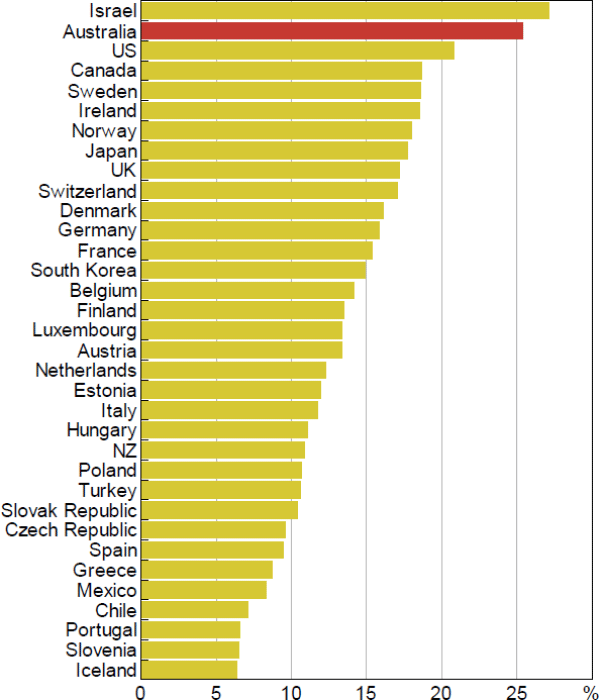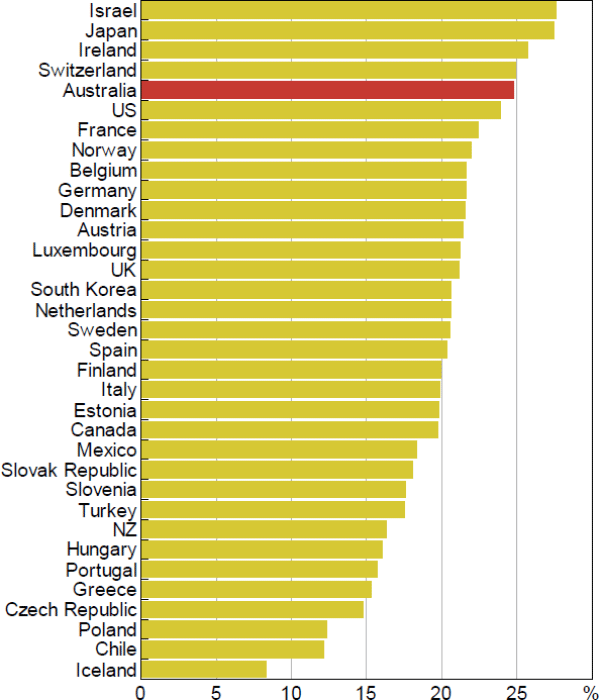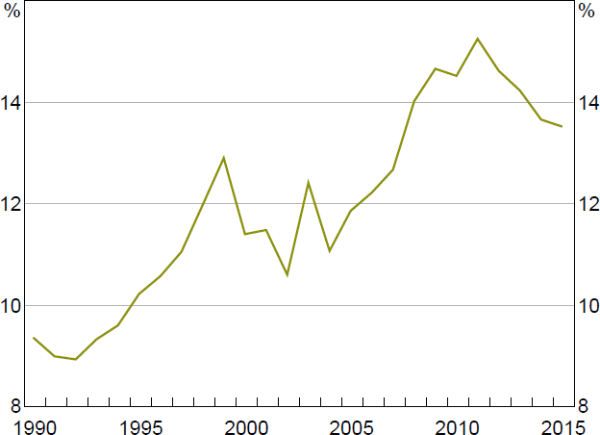RDP 2016-03: Why Do Companies Hold Cash? 1. Introduction
May 2016 – ISSN 1448-5109 (Online)
- Download the Paper 1.07MB
By international standards, Australian non-financial companies hold relatively high levels of currency and deposits, or ‘cash’. Australian publicly listed companies rank second within the Organisation for Economic Co-operation and Development (OECD) in their inclination to hold cash relative to other assets (Figure 1).

Sources: Authors' calculations; Compustat; Compustat Global
Company-level analysis indicates that Australia's relatively high OECD ranking persists even when controlling for differences across countries in industry composition, average company size, growth, and earnings volatility. On this basis, Australia still ranks within the top five OECD countries (Figure 2).

Notes: Based on conditional estimates from a regression with control variables that include size, growth, earnings volatility, industry and year fixed effects; the estimates shown reflect the baseline industry, which is manufacturing, in the baseline year of 2014 and assuming a company of average size, growth, and earnings volatility; changes to the baseline will change the average level of cash holdings, but not the relative ranking of countries
Sources: Authors' calculations; Compustat; Compustat Global
There has also been a secular rise in corporate cash in Australia over the past quarter century. The Australian Bureau of Statistics financial accounts indicate that, in aggregate, the cash-to-assets ratio (hereafter, ‘cash ratio’) for non-financial corporations rose from 9½ per cent in 1990 to 13½ per cent in 2015 (Figure 3).[1] Company-level analysis indicates that the rise in cash has been broad-based across industries. Moreover, the trend increase in corporate cash holdings in Australia has outpaced that of the OECD average.

Notes: Ratio to total assets (including fixed assets); cash includes: cash, government bonds, deposits and commercial paper
Sources: ABS; Authors' calculations
Despite Australia's international ranking in non-financial corporate cash holdings there has been, to the best of our knowledge, little research into the reasons why Australian companies hold cash.[2] According to Google Scholar, since 1990 there have been close to 10,000 research articles related to ‘corporate cash’, but only a handful have studied Australian companies.[3]
We aim to fill this gap in the existing literature by exploring the determinants of Australian corporate cash holdings. We also explore why Australian corporate cash holdings have risen over time and examine whether this rise has been ‘abnormal’ (in the sense that it cannot be explained by fundamentals, such as company size, age and earnings volatility).
Following Keynes (1936), several corporate finance theories have developed to explain why companies hold cash. First, the ‘trade-off’ theory (Miller and Orr 1966) postulates that a company's optimal cash holdings are determined by the balance between the benefits and costs of holding liquid assets when cash flows are uncertain. The benefits of holding cash include minimising the transaction costs associated with raising external funds or liquidating assets (‘the transactions motive’) and being able to finance projects in case other sources become too costly (‘the precautionary motive’). The main cost of holding cash is the opportunity cost of the money held in liquid assets.
Second, the ‘pecking order’ (or ‘financing hierarchy’) theory (Myers and Majluf 1984) states that to minimise asymmetric information costs, companies should finance their investment first with internal cash then with debt and finally with equity. This theory suggests that companies use cash as a buffer between retained earnings and investment needs.
Third, the ‘free cash flow’ (or ‘managerial excess’) theory (Jensen 1986) argues that business managers are prone to pursue their own interest over the interests of owners and creditors, and hence have an incentive to divert resources to activities that personally benefit them. By holding cash, managers increase the amount of assets under their control and gain discretionary power over the company's investment decisions.
We will refer to the first two theories under the broad heading of the ‘financing frictions hypothesis’. Under both theories, companies hold cash as a buffer against being financially constrained (either now or in the future). We will refer to the third theory as the ‘agency costs hypothesis’.[4] The financing frictions and agency costs hypotheses are not necessarily competing hypotheses; in fact, the two hypotheses are perfectly compatible with each other. Our aim is to gauge the weight of evidence for each hypothesis in explaining why Australian companies hold cash.
These hypotheses are tested using longitudinal information on a large sample of both private and public companies from a database provided by Dun and Bradstreet (D&B). There are important differences between private and public companies that are likely to help shed light on cash management behaviour. Public companies can raise capital from the general public and can have an unlimited number of shareholders. In contrast, private companies cannot raise funds from the public because disclosure is required.[5] The organisational differences between private and public companies are used to directly test the two main hypotheses for holding cash:
- Financing frictions hypothesis: public companies have greater access to external finance than private companies and should hold less cash, on average.
- Agency costs hypothesis: public companies typically have greater separation of ownership and management than private companies and should hold more cash, on average.
To understand the determinants of the trend increase in cash holdings over the past quarter century, we turn to a separate source of company-level information from Morningstar. We focus on publicly listed companies as the existing evidence suggests that the rise in cash holdings has been largely concentrated among publicly listed companies and long-run panel data are only available for listed companies.
Our main contribution to the existing literature is to provide the first detailed analysis of why Australian companies hold cash. A large (and growing) body of international research has analysed the determinants of company cash holdings for the United States (Opler et al 1999; Dittmar and Mahrt-Smith 2007; Foley et al 2007; Harford, Mansi and Maxwell 2008; Bates, Kahle and Stulz 2009), the United Kingdom (Ozkan and Ozkan 2004), Japan (Pinkowitz and Williamson 2001), east Asia (Horioka and Terada-Hagiwara 2013) and Europe (Riddick and Whited 2009).
The rise in US corporate cash holdings has been described as a ‘puzzle’ (Pinkowitz, Stulz and Williamson 2013).[6] But, as the international comparison suggests, Australian companies hold more cash than US companies, on average, and this has become increasingly apparent over time. So the Australian ‘corporate cash puzzle’ seems worthy of investigation.[7]
A common feature of the existing literature is a focus on publicly listed companies, largely due to data availability. But the literature is increasingly examining the behaviour of public and private companies, as the necessary micro data become available. Recent studies have compared the cash management behaviour of public and private companies for the United States (Gao, Harford and Li 2013; Asker, Farre-Mensa and Ljungqvist 2011), the United Kingdom (Gogineni, Linn, and Yadav 2012) and Europe (Akguc and Choi 2013). We contribute to this expanding literature by comparing the cash management behaviour of public and private companies in Australia.
The other contribution of our paper is to provide an empirical assessment of the investment and financing decisions of private companies in Australia. Private companies are a large and underexplored part of the Australian economy. In Australia, 99 out of 100 companies are privately held and account for over 40 per cent of total corporate assets and sales and about one-third of corporate profits. By considering the behaviour of both public and private companies, our results are likely to be representative of the corporate cash management practices of companies in the economy.
An understanding of corporate cash holdings is important from a policy perspective. First, increases in aggregate corporate cash holdings might be important for understanding the current state of corporate profitability, risk and growth. If companies have a precautionary saving motive and are ‘hoarding’ cash rather than investing or paying out dividends, then this might be evidence that companies expect the economy to slow. Alternatively, if companies have a speculative motive for holding cash, then an increase in cash might be evidence that some companies expect economic conditions to improve in the future.
Second, how companies allocate their financial resources is important to monetary policy to the extent that companies build up stockpiles of cash, which affect the transmission of balance sheet (and cash flow) shocks to corporate investment. We find evidence consistent with companies holding cash to buffer against potential shocks. These precautionary holdings of cash might help companies to avoid financing constraints and thereby lower the sensitivity of investment to monetary policy shocks, though we leave such an investigation to future research.[8]
To understand the policy implications of high cash holdings it is important to first understand why companies hold cash and to identify the extent to which those holdings of cash are ‘excessive’. This is our main focus; we leave a more detailed exploration of the links between monetary policy, interest rates and corporate cash to future research.
To preview our main results, we find that:
- Public companies hold more cash, on average, than private companies, suggesting that agency costs play some role in determining cash holdings.
- The trend increase in the cash holdings of publicly listed companies can be largely explained by changes in observable company characteristics. In particular, relative to their counterparts of 25 years ago, publicly listed companies today have better growth opportunities (as measured by Tobin's Q) and are more likely to operate in ‘risky’ industries (with relatively high earnings volatility), and these characteristics are correlated with higher levels of corporate cash. This suggests that financing frictions are important too, and that some companies have precautionary and speculative motives for holding cash.
- By historical standards, cash holdings of Australian publicly listed companies are not ‘excessive’ after accounting for observable company characteristics.
Footnotes
The aggregate financial accounts estimates of the cash ratio are much lower than that based on the listed public company data shown in Figure 1. This is because the financial accounts measure is an asset-weighted average, whereas the company-level average is unweighted. As smaller companies tend to hold higher levels of cash relative to assets, the unweighted average is therefore much higher. The financial accounts also include private companies and unlisted public companies, which typically hold lower shares of cash than listed public companies. [1]
Fang, Kosev and Wakeling (2015) provide a detailed overview of recent trends in Australian corporate financing, but do not explicitly consider the long-run determinants of corporate cash. [2]
We can find only a few references to Australian corporate cash in international cross-country studies (Iskander-Datta and Jia 2012; Horioka and Terada-Hagiwara 2013). [3]
Agency costs usually refer to the conflicts between a public company's shareholders and managers. In a public company, agency costs occur when the company's management (or ‘agent’) puts their own interests above those of shareholders (or ‘principals’). In the case of cash holdings, agency costs can include the costs incurred if the manager uses cash to overinvest in negative net present value projects or the costs involved in aligning the incentives of managers with shareholders through appropriate remuneration packages. [4]
There are certain specific circumstances when private companies can raise funds without disclosure, for example, when it is a personal offer made to investors that do not need disclosure because of their financial capacity. This notwithstanding, there are still binding limits to the number of shareholders. [5]
Another popular explanation for why US companies hold cash concerns repatriation taxes (Foley et al 2007; Sánchez and Yurdagul 2013). However, empirical evidence in favour of the repatriation tax motive for US companies appears mixed. And importantly, the Australian taxation system does not appear to provide Australian companies with an incentive to hold cash in the same way as the US taxation system may do for US companies (see Appendix A for more details). [6]
Media reports frequently point to the very high levels of cash held by the largest US companies, such as Apple, Google and Microsoft. Similar to the United States, corporate cash is highly concentrated in Australia. However, the degree of concentration has declined over time. This suggests that the secular rise in corporate cash holdings in Australia is not due to a few very large companies, but is a more broad-based phenomenon. We explore this in more detail in Appendix B. [7]
Alternatively, high levels of cash might make the economy more sensitive to monetary policy. Adão and Silva (2015) suggest that high levels of cash might make the economy more sensitive to monetary policy because it lowers the speed at which the real interest rate adjusts back to its equilbrium level. The real effects occur because companies use their cash in different ways, according to their cash holdings at the time of the shock. Companies with little cash adapt faster to the shock while companies with large cash holdings take longer to adapt. The different reaction in spending makes the price level move slowly after an increase in the nominal interest rate. Therefore, monetary policy has a more protracted effect on the economy. [8]